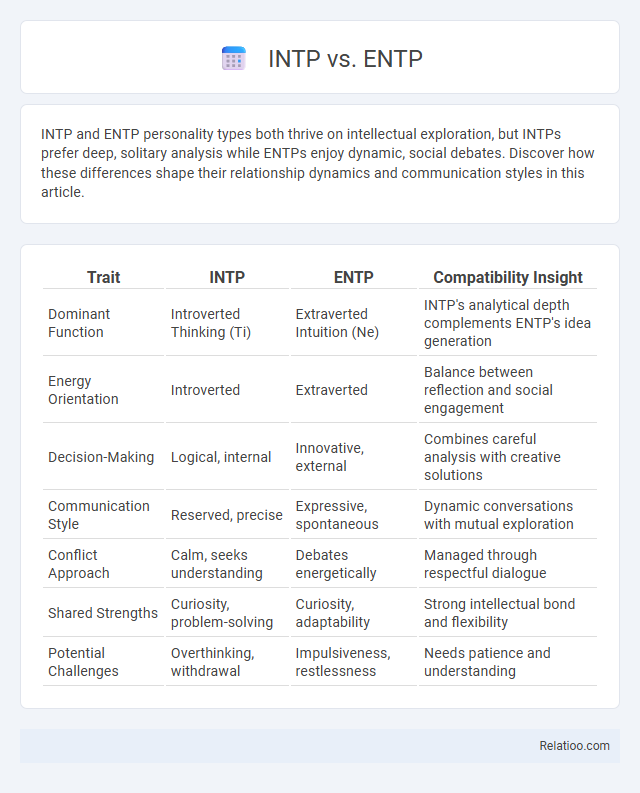INTP and ENTP personality types both thrive on intellectual exploration, but INTPs prefer deep, solitary analysis while ENTPs enjoy dynamic, social debates. Discover how these differences shape their relationship dynamics and communication styles in this article.
Table of Comparison
| Trait | INTP | ENTP | Compatibility Insight |
|---|---|---|---|
| Dominant Function | Introverted Thinking (Ti) | Extraverted Intuition (Ne) | INTP's analytical depth complements ENTP's idea generation |
| Energy Orientation | Introverted | Extraverted | Balance between reflection and social engagement |
| Decision-Making | Logical, internal | Innovative, external | Combines careful analysis with creative solutions |
| Communication Style | Reserved, precise | Expressive, spontaneous | Dynamic conversations with mutual exploration |
| Conflict Approach | Calm, seeks understanding | Debates energetically | Managed through respectful dialogue |
| Shared Strengths | Curiosity, problem-solving | Curiosity, adaptability | Strong intellectual bond and flexibility |
| Potential Challenges | Overthinking, withdrawal | Impulsiveness, restlessness | Needs patience and understanding |
Introduction to INTP and ENTP Personality Types
INTP and ENTP personality types, both part of the Myers-Briggs Type Indicator, reveal unique cognitive preferences: INTPs are analytical introverts who prioritize logical reasoning and internal reflection, while ENTPs are extroverted innovators driven by curiosity and adaptability. Your understanding of these types can enhance interpersonal dynamics and self-awareness by highlighting differences in decision-making processes and social engagement. Exploring the Reaction between these personalities uncovers how their contrasting energy sources and thought patterns influence collaboration and conflict resolution.
Core Similarities Between INTP and ENTP
INTP and ENTP personality types share a foundation in intuitive thinking, valuing innovative problem-solving and intellectual exploration. Both prioritize creativity and abstract reasoning, making Your interactions rich with conceptual insights and dynamic brainstorming. Their core similarity lies in cognitive flexibility and a preference for open-ended discussions, which fuels their shared enthusiasm for discovering novel ideas.
Key Differences in Cognitive Functions
INTP and ENTP are both intuitive thinkers but differ significantly in their cognitive functions, shaping distinct approaches to processing information. INTPs primarily use Introverted Thinking (Ti) for deep analysis and logical consistency, while ENTPs rely on Extraverted Intuition (Ne) to explore ideas and possibilities dynamically. Your reaction to tasks or problems will vary as INTPs prefer solitary, internal reflection, whereas ENTPs thrive on external engagement and rapid ideation.
Communication Styles: INTP vs ENTP
INTP communication style is characterized by thoughtful analysis, precise language, and a preference for deep, theoretical discussions, often focusing on internal logic and abstract concepts. ENTPs exhibit dynamic, energetic communication, thriving on spontaneous debate, idea generation, and adaptability in conversations, frequently using humor and charisma to engage others. The interaction between INTP and ENTP communication styles often results in complementary dialogue where INTPs provide analytical depth while ENTPs drive innovation and energetic exploration of ideas.
Problem-Solving Approaches Compared
INTP and ENTP personalities exhibit distinct problem-solving approaches, with INTPs favoring deep analysis and logical frameworks, while ENTPs thrive on innovative brainstorming and exploring unconventional ideas. Your reaction in problem-solving scenarios can be influenced by these cognitive styles, where INTPs tend to reflect internally to find solutions, whereas ENTPs actively test hypotheses and adapt dynamically. Understanding these differences can optimize collaborative efforts by leveraging INTP's precision and ENTP's creativity for comprehensive problem resolution.
Social Interaction and Friendship Dynamics
INTP and ENTP personalities differ in social interaction, with INTPs favoring deep, thoughtful conversations and solitary reflection, while ENTPs thrive on lively debates and spontaneous socializing. Your friendship dynamics with an INTP often involve mutual intellectual respect and patience for their introspective nature, whereas ENTP friendships are characterized by energy, adaptability, and playful challenges. Reaction styles vary as INTPs process emotions internally, leading to calm, measured responses, while ENTPs respond quickly and expressively, often steering social energy toward innovation or problem-solving.
Career Strengths and Workplace Behavior
INTP individuals excel in analytical problem-solving, thriving in careers that require deep focus and innovative thinking, such as research, engineering, or software development, where independent work is valued. ENTPs bring creativity and adaptability to dynamic work environments, often excelling in roles involving negotiation, entrepreneurship, or marketing due to their strategic thinking and persuasive communication. Your reaction to workplace challenges is shaped by these natural tendencies; INTPs prefer logical analysis and reflection before responding, while ENTPs quickly generate multiple solutions and engage others in brainstorming to navigate obstacles efficiently.
Conflict Resolution Styles
INTP conflict resolution style emphasizes logical analysis and thoughtful reflection, seeking to understand underlying principles and avoid emotional confrontation. ENTPs approach conflict with quick thinking and adaptability, often engaging in debate to explore multiple perspectives and find innovative solutions. Your ability to navigate conflicts varies, with INTPs prioritizing reasoned consensus, while ENTPs favor dynamic interaction and creative problem-solving.
Growth Paths and Personal Development
INTP and ENTP personality types share a foundation in intuition and thinking, but INTPs grow through deep self-reflection and honing analytical skills, while ENTPs develop by embracing experimentation and external engagement. Your growth path as an INTP involves cultivating emotional intelligence to complement intellectual strengths, whereas ENTPs benefit from practicing patience and follow-through to balance their visionary ideas. Reaction to challenges differs: INTPs internalize and analyze, while ENTPs adapt quickly and seek innovative solutions, guiding your personal development uniquely.
Which Personality Type Are You?
INTP and ENTP personality types both belong to the intuitive and thinking categories but differ in their orientation toward the external world; INTPs are more introspective and analytical, while ENTPs show energetic engagement and adaptability in social settings. Reaction or how individuals respond to stimuli reveals distinct cognitive preferences, with INTPs favoring deep, logical analysis and ENTPs demonstrating innovative problem-solving through spontaneous idea generation. Identifying which personality type you are involves assessing whether your dominant trait is inward-focused reflection (INTP) or outward-focused exploration (ENTP), highlighting the complexity of your cognitive and behavioral reactions.

Infographic: INTP vs ENTP
 relatioo.com
relatioo.com